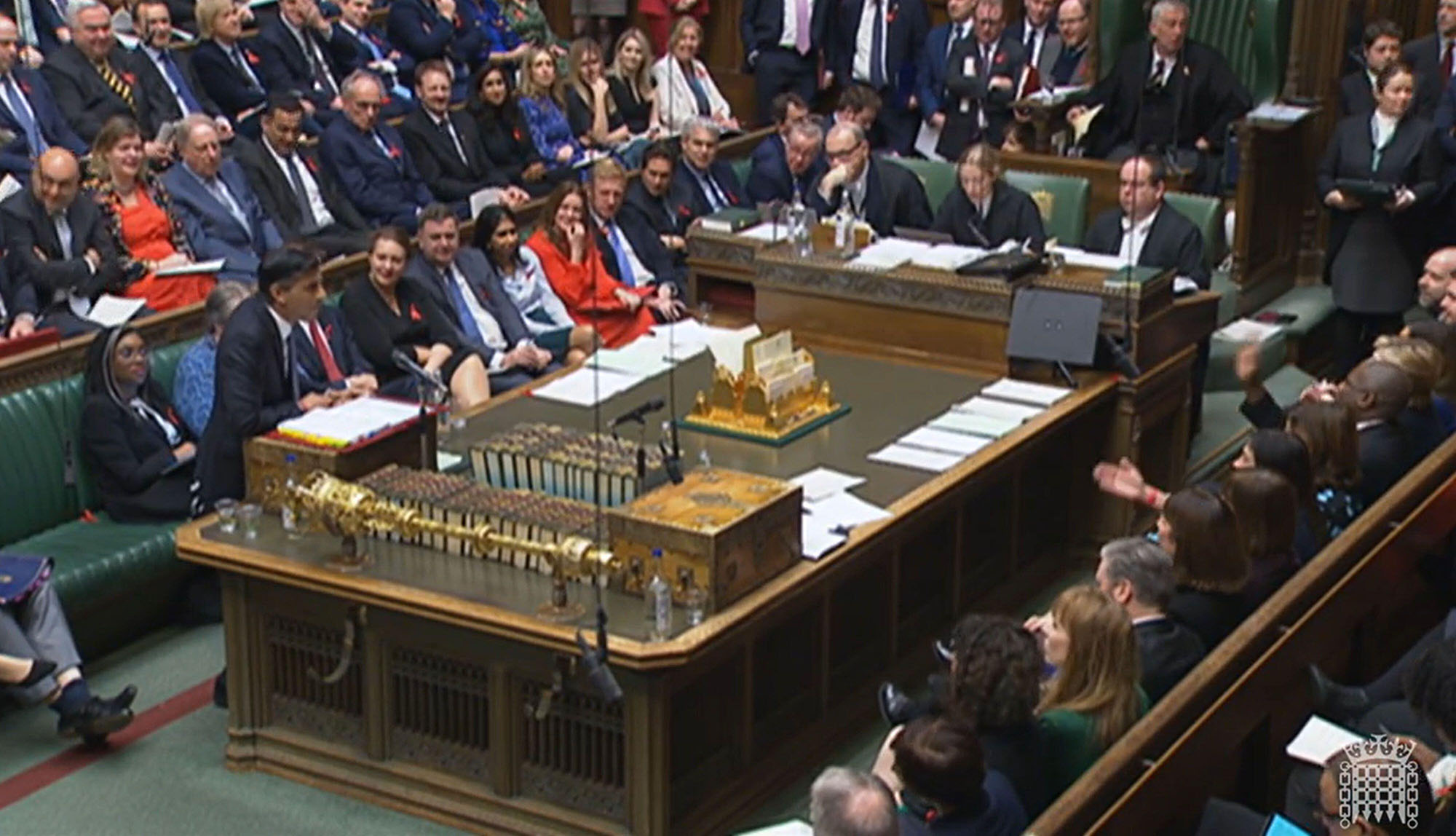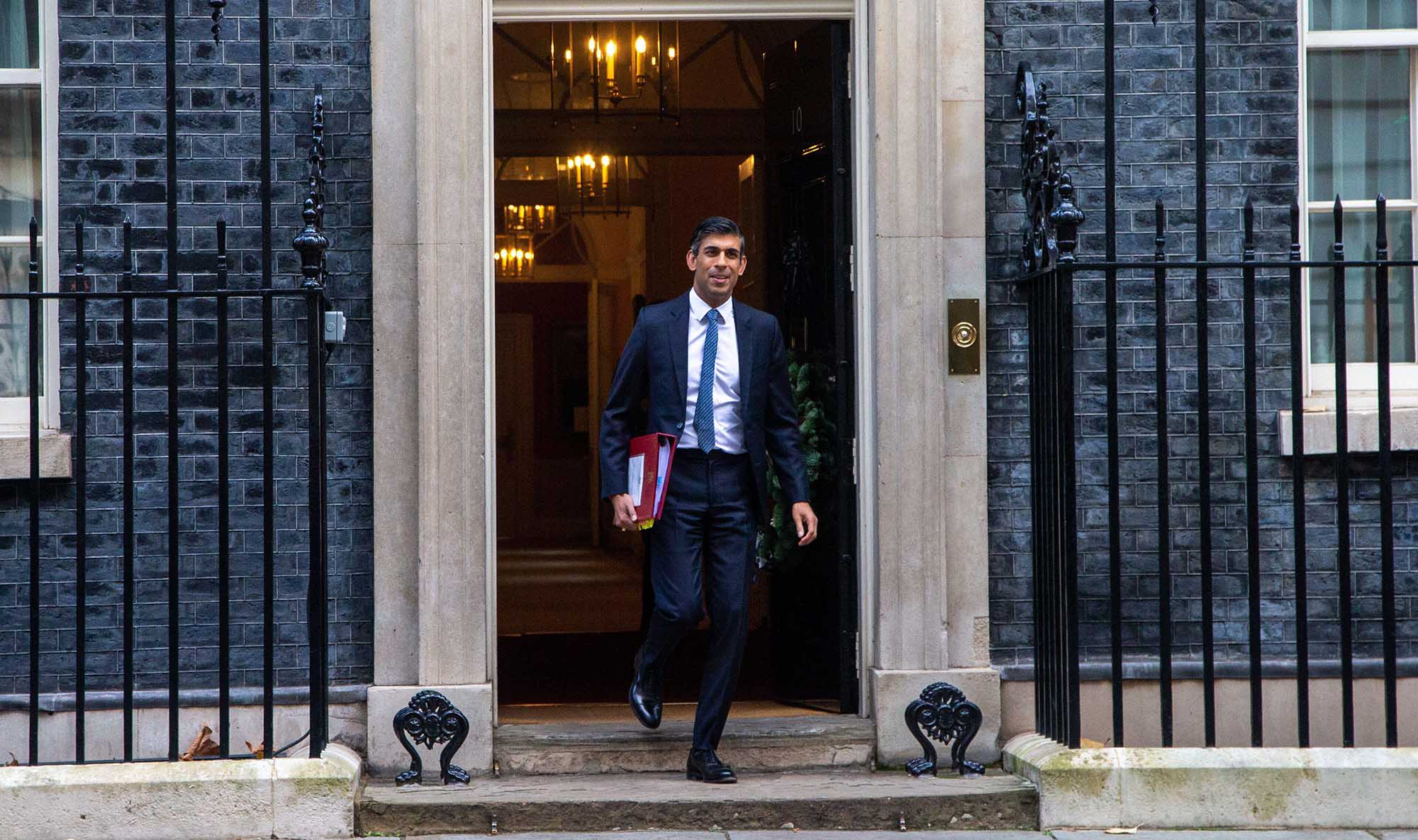Rishi Sunak Is Already Struggling To Keep “Ungovernable” MPs In Line
Rishi Sunak's honeymoon as PM is well and truly over as he faces multiple rebellions from Tory MPs (Alamy)
7 min read
The day Rishi Sunak took over as Prime Minister he was warned he was inheriting an “ungovernable” party, and the past few weeks have not seemed to prove otherwise.
Sunak faces multiple rebellions and open dissent from fractious MPs which threaten to derail his administration’s attempts to address the long list of issues he inherited.
Veteran Tory backbencher Christopher Chope, who heeded the warning in a BBC Radio Four interview as Sunak took office, added that his party is “completely riven”. Just over a month later questions over whether Sunak can put it back together again are becoming increasingly urgent with the spectre of defeat looming at the next election.
An uneasy coalition of unfamiliar Midlands and the Northern seats, and more traditional “Shire Tories” from the South of England has resulted in a varied range of priorities among Conservative MPs. When Boris Johnson was elected in 2019 they were united on delivering Brexit and defeating Jeremy Corbyn, but not much else. Now that Johnson, Corbyn, and getting Brexit over the line are no longer relevant, their lack of common ground is more apparent than ever.
Rows are now brewing over homebuilding and onshore wind, pitting the two wings against each other and threatening to derail the flagship Levelling Up bill.
The former Chancellor Sajid Javid, one-time mentor to Sunak, added his name on Friday to the growing list of high-profile Tories who do not intend to stand at the next election, while his party suffered a crushing defeat in the Chester by-election on Thursday, his first ballot box test.
The shadow of Johnson’s leadership looms large over Sunak, with one former Cabinet minister telling PoliticsHome they believed the disgraced ex-prime minister is “the only person who could pull this party together”.
Normally government whips would corral MPs through patronage, but several of the very many former ministers now sitting on the Tory backbenches warned that the tactic is no longer working.
Another former secretary of state, who spent time in the whips' office, said the Conservative Party has “been permanently in a state of fracture” for the past six years and that is now its default position, but felt the current rebellions can be seen as “a kind of tool of communication with the centre”.
.jpeg) Ex-Chancellor Sajid Javid has announced he is standing down as a Tory MP (Parliament.UK)
Ex-Chancellor Sajid Javid has announced he is standing down as a Tory MP (Parliament.UK)
“The constant effort of mining information from the backbenches, feeding concerns in and out in a continuous process, I don't think happens in anything like the same way anymore,” they explained.
They suggested the rise of those within government communicating via WhatsApp has killed off the “face-to-face discursive style of whipping”, and instead MPs are reaching for rebellion.
“What felt perhaps in the past almost like a nuclear option of putting one’s name to a rebel amendment, and being willing to push it all the way – that’s become one of the first levers you would reach for," they added.
Keeping the flock in line has also been made harder by the rising concern of Tory MPs about their own seat.
The former Cabinet minister said colleagues were just this week discussing how big a majority they would need to feel safe that they could be re-elected in 2024.
“Someone said about 6,000, but another said no, anything less than 10,000 and you are in danger,” they explained.
“Now that will affect someone's posture and behaviour, if they think they are at risk they will need to do everything they can to show they are standing up for local interests.
“And that will be a worry for No 10 and the whips' office, there are very few goodies they can offer to keep people in line.”
 One MP said Tories have “been permanently in a state of fracture” for the past six years (Alamy)
One MP said Tories have “been permanently in a state of fracture” for the past six years (Alamy)
Henry Hill, deputy editor at the ConservativeHome website, agreed there is a growing number “of essentially un-whippable people whom you can't dangle anything in front of”. But he bemoaned the fact the Conservatives have “basically destroyed the institutional memory of the whips' office by rotating it so often”, and said the current operation is not effective.
“You had Gavin Williamson being the deniable ‘ops wing’ of the whips’ office from the cabinet office, but that's not working now because he’s gone,” he explained.
“So you basically now have Simon Hart as Chief Whip being good cop without having a bad cop.”
Hill said it fits into a broader theme of the changing culture of the Commons and that the whips’ office is “not the instrument of party control that it was”, while the current government doesn't have the gift of patronage amid the growing sense they are going to lose the next election.
Another former Cabinet minister and veteran Tory MP said Sunak’s problem is there is still a caucus within the party – both in Parliament and across the membership – who perceive him “as having done the dirty on Boris”.
They explained: “More widely, the other point is that we know that [Sunak] is not widely supported within the party, there was a minority of support for him.
“He became Prime Minister in very strange circumstances, we haven't seen much recovery in the polls, people are getting concerned that the policies being followed are not noticeably conservative.
“So with all these factors, people are really wondering, how long is he going to be there?”
 Rishi Sunak faces an uphill battle to unite the warring Tory party before the next election (Alamy)
Rishi Sunak faces an uphill battle to unite the warring Tory party before the next election (Alamy)
They had noticed that Tory MPs are a bit more rebellious than usual, adding that “discipline is lightly maintained because I think that the whips know that people are not going to be corralled anymore”.
But they rejected the suggestion the party is entirely “ungovernable”, and instead questioned whether Sunak “is the individual to govern it”.
“Overwhelmingly the feeling I have from the party is that they want Boris Johnson back,” the ex-Cabinet minister added.
“I talk regularly to people in the country, and they're incensed that Boris was defenestrated, and a lot of them don't like Rishi. So it's as simple as that.”
They believed that only Johnson could replicate the electoral coalition he assembled in 2019, meaning he is the only one who could reunite the party.
"If you look at the 'Red Wall’, these are people who would die in a ditch for him,” the ex-Cabinet minister said.
But the former immigration minister Kevin Foster said the party could still come together when needed to get things done.
“I wouldn’t say we’re a rabble,” he told this week’s episode of PoliticsHome podcast, The Rundown.
Foster pointed to the passing of the finance bill this week with a huge Tory majority, despite some disquiet about the measures contained in it as outlined in the Autumn Statement, saying we have not seen “razor-thin votes because of large numbers of rebellions”.
Foster said that the Tories were all still “united together around what we need to do” to move the country forward.
“There's the odd disagreement, but if your disagreements are about things like whether we have onshore wind or not, it's not absolutely fundamental to how we manage the economy and how we manage public services,” he said.
But Robert Colvile, director of the Centre for Policy Studies think tank and one of the authors of the Conservative Party’s 2019 election manifesto, told The Rundown in his view, “the Tory party has become more rebellious and more fractious”, saying MPs have become individualistic in recent years.
He said that now the “bitter medicine” of the Autumn Statement had gone down, Tories are looking for Sunak and his Chancellor Jeremy Hunt to “set out a positive and optimistic vision, and something that might actually convince people to vote for us”.
